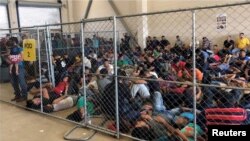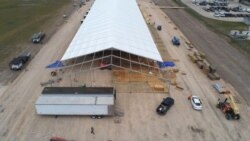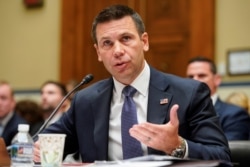Updated July 19, 2019, at 9:01 p.m.
A day after testifying before members of U.S. Congress on border facility conditions, the head of the Department of Homeland Security is heading back to the U.S.-Mexico border for the fourth time in recent weeks, this time joined by a group of senators.
The lawmakers, which included 12 Democrats and one Independent, said they visited McAllen, Texas — one of the busiest sites for Border Patrol agents detaining people who enter the country without authorization — as part of their oversight duties.
Arriving early Friday, the lawmakers were scheduled to join Acting DHS Secretary Kevin McAleenan to "investigate, inspect, and evaluate conditions at facilities on the southern border," according to a statement from the office of Senate Democratic Leader Chuck Schumer.
Schumer said the delegation saw “one good place” during their daylong trip — a shelter run by Catholic Charities.
“But the rest of the facilities weren’t close to that,” he said of the other locations, all government-run centers for detained migrants.
The delegation visited the Donna Soft-Sided Processing Facility, a local nongovernmental organization, the McAllen Border Patrol Station, and the Ursula Central Processing Center, according to DHS.
Senator Chris Coons of Delaware said he asked a young boy at one center if he’d been able to brush his teeth in the facility. The boy responded, “No.”
Since the start of the fiscal year in October 2018 through June 2019, Border Patrol agents apprehended 688,375 people who entered the country without authorization, including 390,308 people traveling as families, and 63,624 unaccompanied children. The numbers are the highest in a decade and include a larger proportion of families and unaccompanied minors who require more specialized care.
The congressional delegation is the latest to visit government-run processing centers, where recently detained migrants who entered the country without authorization are initially held by U.S. Border Patrol.
The treatment of people in such facilities has long been criticized, especially by human rights groups, immigrant advocates, and lawyers who work in the area.
As border arrivals have increased, so too has scrutiny of their treatment by Border Patrol agents and the conditions in which they are detained.
Provoking outcries were the deaths of several children in CBP custody in late 2018, the influenza outbreak blamed for a migrant teen's death, and media reports as well as the government's own inspectors about unsanitary conditions at detention centers.
Last week, U.N. human rights chief Michelle Bachelet condemned how the U.S. is handling migrants at the border.
McAleenan letter
The Trump administration maintains many of the criticisms have been addressed or are being resolved. As lawmakers headed to the border, McAleenan sent a letter to House Speaker Nancy Pelosi detailing how $4.6 billion in emergency funding approved by Congress late last month has improved the conditions and care of families in DHS custody.
"No law enforcement agency in the United States is bringing more medical capability to ensure the health and safety of those it encounters or holds in custody than CBP," he wrote.
McAleenan highlighted the millions of meals prepared by border officials for detained migrants, health interviews, and thousands of migrant medical assessments for individuals in CBP custody.
He said U.S. Border Patrol agents have taken more than 21,000 sick or injured migrants to hospitals and conducted medical transportation or stood hospital watch for more than 245,000 hours. (One of the leading criticisms against the agency is how they treat detainees in their custody with health problems.)
Interim report
McAleenan also invited Pelosi to discuss the nonpartisan Homeland Security Advisory Council's (HSAC) expert recommendations.
The 10-member group met Wednesday for a roundtable conversation on its recent bipartisan report.
The group visited CBP facilities between October 2018 and April 2019, identified best practices for law enforcement interactions with migrants, studied aspects of care for children and adults in short-term custody, and provided recommendations for changes to the agency's policies and procedures. They spoke with more than 100 people, among them medical professionals, NGO representatives, government officials and other experts.
HSAC's chair Karen Tandy said this is not their final report, and that "very early on" the group concluded that the U.S. immigration system is "overwhelmed and fractured at every critical point."
They decided to file an interim report because of how "alarmed" they were after traveling to the border.
"The tender-age children, especially children below the age of 12, are at the heart of this crisis," she said.






